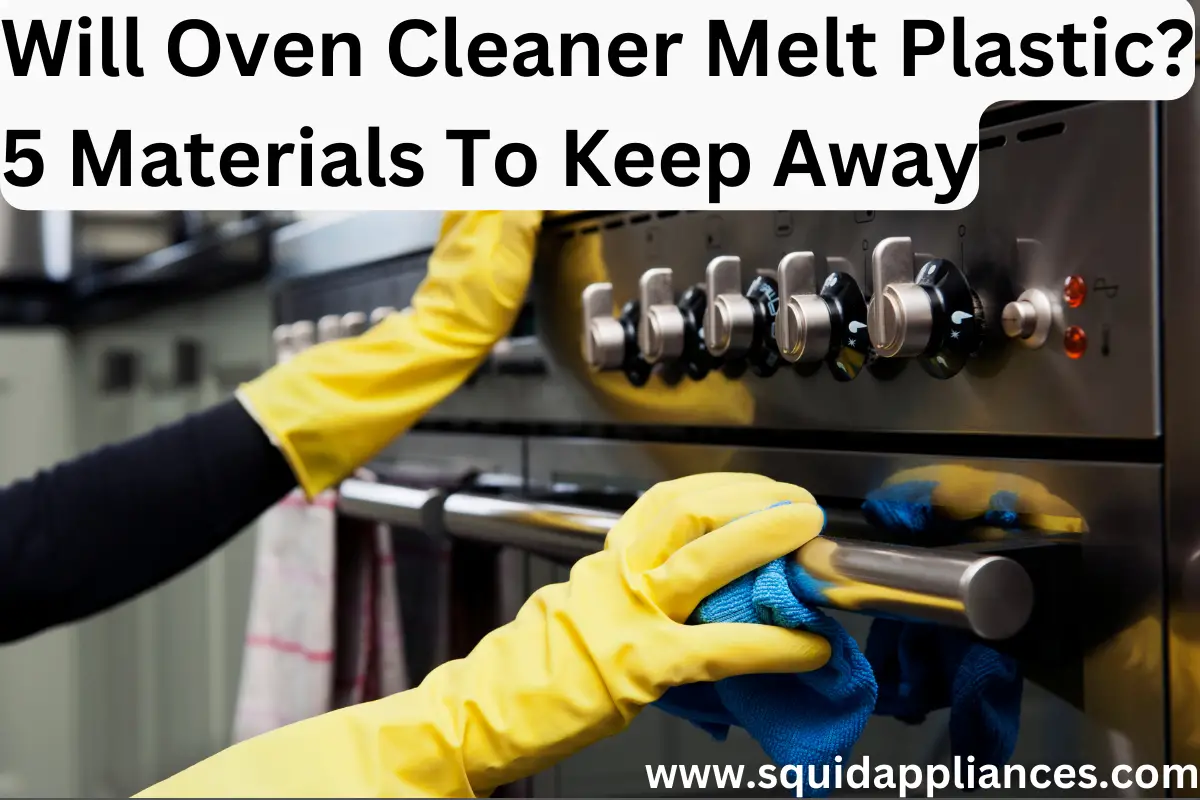In this article, I will discuss the potential effects of oven cleaner on plastic materials and provide five specific types of plastic to keep away from this powerful cleaning agent.
As a chemist with extensive knowledge in material science, I understand the importance of understanding the compatibility between cleaning products and various materials. When it comes to plastics, certain types can be particularly vulnerable to the aggressive nature of oven cleaner.
The chemical composition of these plastics makes them susceptible to melting or warping when exposed to the strong chemicals found in oven cleaners. It is crucial to take precautions and avoid using oven cleaner on these specific plastic surfaces to prevent irreversible damage.
Additionally, I will suggest alternative cleaning methods for plastic items and provide useful tips on how to safely clean while avoiding any potential hazards associated with oven cleaner.
Will Oven Cleaner Melt Plastic?
Yes, certain types, like PVC and polystyrene, are vulnerable. Avoid damage by opting for mild soap and water for cleaning. Check our list of 5 plastics to keep away from this powerful cleaner. Protect your plastic surfaces by using safe cleaning alternatives and following precautions to prevent irreversible harm.
Key Takeaways
- Oven cleaner can damage certain types of plastic materials, such as PVC and polystyrene.
- Precautions should be taken when using oven cleaner on plastic surfaces, and mild soap and water are recommended for cleaning instead of harsh chemicals.
- Caustic and alkali-based oven cleaners can cause damage to plastics, and abrasive cleaners should be avoided as they can scratch and weaken plastic surfaces.
- It is important to choose an oven cleaner that is safe for use on plastic surfaces and to follow manufacturer’s instructions to minimize the risk of damage.
Types of Plastic Vulnerable to Oven Cleaner
You’ll want to keep an eye on plastic containers, as oven cleaner can easily melt them. Certain types of plastic are especially vulnerable to the corrosive properties of oven cleaner. Polyvinyl chloride (PVC) and polystyrene are two examples of plastics that can be affected.
To clean plastic, it’s best to use mild soap and water rather than harsh chemicals like oven cleaner. This will help preserve the integrity of the plastic material.
Potential Damage to Plastic Surfaces
Avoid exposing your plastic surfaces to this powerful solution, as it has the potential to cause significant damage. To preserve your plastic surfaces, it is crucial to understand which types of plastics are vulnerable to oven cleaner.
Refer to the table below for a comprehensive list of 5 materials that should be kept away from oven cleaner.
Additionally, explore effective cleaning methods that will help maintain the integrity of your plastic surfaces.
| Plastic Material | Vulnerability |
|---|---|
| Polyvinyl chloride (PVC) | Highly Vulnerable |
| Polystyrene (PS) | Moderately Vulnerable |
| Polypropylene (PP) | Slightly Vulnerable |
| Acrylic (PMMA) | Slightly Vulnerable |
| Polycarbonate (PC) | Highly Vulnerable |
Implementing proper cleaning techniques and using suitable alternatives can ensure plastic surface preservation while effectively removing dirt and grime.
Precautions to Take When Using Oven Cleaner
Before using oven cleaner, it’s crucial to take precautions to ensure the safety of your plastic surfaces. Here are four important considerations:
- Avoid caustic and alkali-based oven cleaners as they can cause damage to plastics.
- Stay away from abrasive cleaners that can scratch and weaken plastic surfaces.
- Don’t fall for common misconceptions that all oven cleaners are safe for all materials.
- Always read and follow the manufacturer’s instructions to minimize the risk of damage to your plastic surfaces.
Alternatives for Cleaning Plastic Items
Looking for a safer and gentler way to keep your plastic items clean and shiny? Consider eco-friendly options and homemade cleaning solutions as alternatives to using oven cleaner. These options aren’t just better for the environment, but they also minimize the risk of damaging your plastic items.
Homemade cleaning solutions can be easily made using ingredients like vinegar, baking soda, or lemon juice. They’re effective in removing dirt and grime without harming the plastic material.
Tips for Safely Cleaning with Oven Cleaner
To safely clean with oven cleaner, you can easily achieve sparkling results on your plastic items without any worry of damage. When using oven cleaner on plastic, it’s important to follow these effective cleaning methods.
Firstly, make sure to choose an oven cleaner that’s safe for use on plastic surfaces. Avoid using products that contain harmful chemicals such as bleach or ammonia, as they can cause discoloration or even melt the plastic. Always read the labels and instructions carefully before applying any cleaning product to your plastic items.
Frequently Asked Questions
Can oven cleaner damage all types of plastic?
Yes, oven cleaner can damage all types of plastic due to chemical reactions. It is important to prioritize plastic safety by keeping it away from oven cleaner and other potentially harmful substances.
Is there a specific type of plastic that is more vulnerable to oven cleaner?
Certain types of plastic have a lower melting point, making them more vulnerable to damage from oven cleaner. It is important to identify the specific type of plastic before using any chemicals that could potentially cause harm.
Are there any precautions to take when using oven cleaner on plastic surfaces?
When cleaning plastic with oven cleaner, it is important to take precautions to protect the surfaces. Covering the plastic with a protective barrier or using a milder cleaning agent can help prevent damage from the oven cleaner.
What are some alternative cleaning methods for plastic items that should not be exposed to oven cleaner?
Natural cleaning alternatives for plastic items include using a mixture of vinegar and water, baking soda paste, or lemon juice. To protect plastic surfaces from chemical damage, avoid using harsh cleaners like oven cleaner and opt for gentler options.
Can oven cleaner cause discoloration or fading on plastic surfaces, and if so, how can it be prevented?
Yes, oven cleaner can cause discoloration or fading on plastic surfaces. It may also affect the durability of the plastic. Additionally, oven cleaner can interact with other chemicals present on the plastic surfaces, potentially causing further damage. To prevent this, it is recommended to avoid using oven cleaner on plastics and instead use alternative cleaning methods that are safe for plastic items.
Conclusion
In conclusion, it’s crucial to be aware that oven cleaner has the potential to melt certain types of plastic materials. It’s essential to identify and avoid vulnerable plastics when using this cleaning product.
The possible damage to plastic surfaces shouldn’t be underestimated, as it can result in permanent harm. To ensure safety, precautions must be taken while handling oven cleaner, such as wearing protective gloves and working in a well-ventilated area.
Exploring alternative cleaning methods for plastic items is also advisable to prevent any unwanted consequences.






